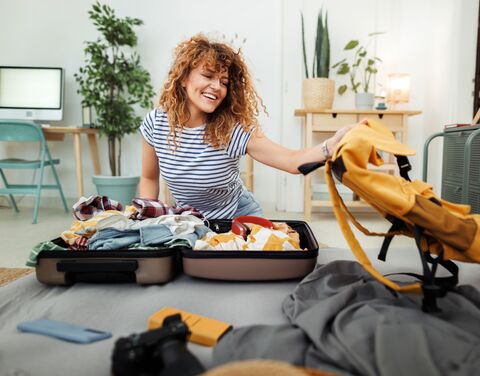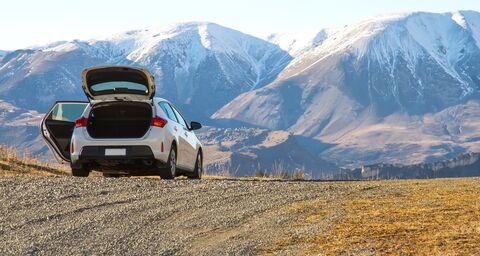
Packing list for vacation: The best way to prepare for your trip
Whether it’s a beach vacation, skiing or a city trip, a weekend getaway, or a trip around the world: Some things are essential when you’re away from home. A packing list for your vacation helps ensure that you always have the most important items and necessary documents with you.
To make sure you don’t forget anything when packing and don’t end up in precarious situations during your vacation, you can find our detailed packing list for your summer vacation or your next camping adventure here.
Packing list for vacation
For a carefree vacation, a well-thought-out packing list is essential. The things you should definitely take with you will of course vary depending on the destination, duration, and time of year. A packing list for a family vacation is also different from one for a trip on your own. However, the following items are important in almost all cases:
Personal documents
- Passport/identity card
Check the validity in advance, especially when traveling outside the Schengen area. - National or international driver’s license
If you rent a car during your vacation, you will need an international driver’s license outside of the EU and EFTA countries. - Travel documents
This includes, but is not limited to, airline tickets, hotel bookings, car rental confirmations and, if required, a valid visa. - Insurance card
Make sure you have your insurance card with you and check whether your insurance is also valid abroad. - Vaccination certificate
Before traveling abroad/long trips to tropical countries, it is essential to find out in good time what vaccinations you need. Information can be found on the website healthytravel.ch. - Copy of important documents
A physical copy of your passport, visa, and booking confirmations as well as a digital backup in the cloud or via email can help in case of loss.
Finances
- Cash
Change some money into the currency of your destination. - Credit and debit cards
Make sure that the cards can also be used abroad. - Emergency contact numbers
Protect yourself in case your credit card is lost or stolen.
Toiletry bag
- Toothbrush and toothpaste
Pack everything you need for your daily oral hygiene – preferably in your hand luggage. - Shower gel and shampoo
Many products are available in special, space-saving travel sizes. - Sunscreen and after-sun lotion
Choose the right protection factor for your skin type and destination and treat your skin after sunbathing with a soothing after-sun lotion. - Contact lenses and solution
For contact lens wearers, both are absolutely essential. - Earplugs
If you are a light sleeper, earplugs can be useful – especially in noisy environments. - Mosquito spray
The blood-sucking pests can be found almost everywhere in the world during the warm season. Mosquito spray should therefore always be on your checklist for summer vacations. - Deodorant
Indispensable for warm holiday regions, so that you feel fresh and comfortable all day long. - Razor and shaving gel
A compact razor model is particularly practical and will keep you feeling fresh on longer journeys or in warm weather. - Women’s hygiene products
Don’t forget to pack any necessary hygiene items such as tampons, sanitary pads, panty liners, wet wipes, or a menstrual cup for a comfortable journey. - Contraception
You should also remember to pack condoms and other contraceptives. - Hand cream
High and low temperatures cause the skin of your hands to dry out – you can prevent this with a hand cream. - Lip balm
The skin on the lips is particularly thin and sensitive, meaning lip balm is a must when it’s hot or the air is dry.
Clothing
- Swimming gear
With a swimsuit, bikini, and swimming trunks, you can enjoy your summer vacation, whether at the beach or by the pool. - Light summer clothing
Take T-shirts, shorts, and light dresses made of linen, cotton or other natural fibers with you for vacations in warmer climes. - Evening wear
Also pack clothes for special occasions or elegant restaurants. - Suitable shoes
Comfortable shoes are suitable for excursions and you should pack sandals for the beach. - Sun hat and sunglasses
When making a packing list for your summer vacation, don’t forget the right UV-protective clothing to protect yourself effectively against the sun. - Underwear
Should not be missing from any vacation packing list. - Pajamas
Especially when staying in hostels or camping, a sleeping bag in addition to pajamas should not be missing. - Hair ties and hair clips
Essential for a simple braid or ponytail with long hair.
First-aid kit
- Medications
You should always have regular medication as well as painkillers and fever-reducing medications with you. - Bandaging
In addition to band-aids, this also includes bandages, quick bandages, scissors, and tweezers. - Anti-allergy medicines
If you suffer from allergies, you should take appropriate medication with you. - Travel sickness
If you are prone to motion sickness with dizziness, nausea, and vomiting or headaches, chewing gum, patches, or pills may help relieve the unpleasant symptoms. - Disinfectants
Even if the hygienic conditions are perfect, it is a good idea to pack disinfectant.
Electronics
- Cell phone and entertainment electronics
Smartphones and the like are important for both communication and entertainment. - Charger
Ideally, you should use chargers that are suitable for different charging cables. - Adapter
Find out in advance whether other types of sockets are used in your destination country. - Camera
If the performance of your cell phone camera leaves something to be desired, it’s worth taking a camera with you on vacation. - Powerbank
Especially during longer hikes without a power connection, it makes sense to pack a powerbank so that you can charge your cell phone if necessary. - Headphones
Headphones are essential when traveling to be able to listen to music or watch series and films in a relaxed manner. - Airplane adapter for headphones
If you’re flying, it’s best to check in advance whether your headphones are compatible with the aircraft ports. - Laptops
A laptop is actually always worth having on vacation – for example, if you are planning a cozy movie night.
Other practical things
- Rain protection
This could be a small umbrella or a rain poncho, for example. - Backpack
For day trips and on the go, so you can carry all the important things practically. - Money belt or chest pouch
Carry cash, cards, and important documents safely with you to give you extra protection when you’re traveling. - Beach towel
Your own beach towel is always important for the beach or pool, and can also be used as a shower towel or sports towel if necessary. - Waterproof bag
At the beach, but also in the rain, you can protect your valuables in a waterproof bag . - Laundry bag
You can collect and store your dirty laundry in it. - Travel-size clothesline and detergent
If you need to wash clothes in between, a small travel clothesline with clips is particularly handy. - Headlamp or flashlight
A flashlight is useful in remote areas and during power outages. - Address book and notebook
Make a note of important information and addresses during your trip. - Books
If you have to bridge long train journeys or long flight times, there is nothing better than a good book.
Checklist for vacationing with child
Good preparation is essential for a relaxed journey with your child. Remember important documents such as passports, insurance cards and, if necessary, vaccination certificates. Clothing adapted to the weather, comfortable shoes, and change of clothes will ensure that you and your child are prepared for any situation. Don’t forget to pack hygiene items such as a toothbrush, sunscreen, and wet wipes. A well-stocked first-aid kit with all the important medications for your child is also indispensable. Here you will find more travel essentials for your family vacation with your child:
Baby food or milk powder
If your child needs special food, you should pack enough for the trip.
Diapers and wet wipes
Essential when you’re on the move, especially on longer journeys or flights.
Mosquito spray for children
Protects sensitive skin from stings, especially in warm areas.
Stroller or baby carrier
Makes longer trips more relaxed and offers a break for tired little legs.
Books, crayons, or radio plays
Entertain your child during long journeys or waiting times and help to bridge the time comfortably.
Vacation checklist as a PDF to print
Which insurance policies should you check before you travel?
If you want to make sure that you are covered for all eventualities, it is important to check your insurance policies before you leave. One of the most important is travel insurance. AXA’s travel insurance has a modular structure. You can combine the basic modules of cancellation cost insurance, personal assistance, and roadside assistance with the following add-on modules – for seamless protection during your travels:
Luggage: Our add-on module will pay for your loss if your carry-ons and checked luggage are lost or arrive late.
Rental car deductible: Assumes the costs of the deductible that is owed to the car rental company or a car-sharing company in the event of accidental damage while traveling or on vacation.
Travel legal protection: This add-on module puts you on the safe side anywhere in the world for legal issues and disputes before, during, and after your vacation.
Medical expenses abroad: Covers costs worldwide that are not covered by your mandatory health insurance.
You can also take out the following types of insurance separately:
Forgotten things: Packing list for vacation
Despite the best preparation, it can quickly happen that you forget certain things at home or simply don’t have them on your radar when you’re packing. Often overlooked items include chargers and adapters for electronic devices, and travel adapters for countries that use other types of sockets. Hygiene articles such as toothbrushes, toothpaste, and contact lens solution or first aid supplies, sunscreen, and mosquito repellent often don’t find their way into the suitcase either. Fortunately, you can easily buy these items at most destinations – even if you don’t include them on your vacation packing list.
It becomes more difficult for individual things, such as important medication that you have to take regularly . Clothing in the right size also falls into this category, especially if you need it for certain activities – such as hiking boots or bathing suits. Important documents such as travel insurance documents and copies of personal documents – for example, if you lose your passport on vacation – are also often forgotten items.
Final travel arrangements
Before you embark on your journey, take a final look around your home and make sure your home is orderly and secure.
- Turn off the power supply
Remove plugs from electrical outlets and turn off unnecessary devices to save energy and prevent potential hazards. - Turn off water and heating
Turn off the taps and turn off the heater to prevent possible water damage and reduce heating costs. - Close windows and doors
Make sure that all windows and doors are tightly locked to prevent damage and burglaries. - Empty the refrigerator and garbage
Empty the refrigerator and dispose of the garbage. Leave leftover food to your neighbors or family to avoid unpleasant odors. - Post and plant care
Arrange for family, friends, or neighbors to receive the post or your parcels. Let them also water your plants. - Deposit a spare key
If anything unexpected happens, give a friend or trusted neighbor a spare key.
Tips: Packing suitcases efficiently for vacation
A packing list for vacation is undoubtedly helpful. However, it is at least as important to do everything right when packing your suitcase.
- Start packing your suitcase early
Under time pressure, you are more likely to forget something. You should therefore start packing about two to three days before departure. This will give you enough time to check whether you have thought of everything you need. If necessary, you can buy any missing items or wash clothes. - Only take what you really need with you
Use a packing list for your vacation to decide which things are essential. If possible, choose items with several functions and only buy liquids once you have arrived at your destination. Also pack clothes that can be easily combined to create several outfits from a limited number of items. - Roll clothes instead of folding them
Another tip for saving space with clothes is to roll them instead of folding them. This has the further advantage that your garments will not crease so easily. T-shirts, pants, and light sweaters are particularly suitable for rolling. By using packing cubes, you can also keep your suitcase tidy. - Fill the spaces inside and in between
Make use of every available space by packing small items in the gaps. This can mean, for example, putting socks or underwear in the corners of the suitcase. You can also store smaller items such as chargers or jewelry inside your shoes. - Check your suitcase at the end
Once you’ve packed everything, take another close look at your suitcase and the vacation checklist: Are all the must-haves for your vacation stowed away? Is there still enough space for any souvenirs and gifts? Sometimes it helps to change the arrangement of items to create more space or improve the weight distribution.
Generally prohibited in luggage
Some items are not allowed in your hand luggage or suitcase, for example flammable substances. Depending on the destination and airline, pressurized containers with gases, sharp objects, and certain foods may also be subject to restrictions.
Carry-on luggage: What to take with you
In addition, some items should be carried in your hand luggage rather than in your suitcase. This applies in particular to important documents such as passports, identity cards, and airline tickets, but also to cash and credit cards. If you need to access them at short notice or your checked luggage gets lost, these things are better kept in your carry-on luggage. Valuables and electronic devices are also more likely to belong in your hand luggage. This will prevent loss, theft, and damage. Consumer electronics, laptops, and the like are particularly useful if they are always at hand – so you can pass the time during your arrival and departure.
Last but not least, you should also understand your hand luggage as an ”emergency suitcase” . After all, it can always happen that you have to stay at the airport longer than expected or that – in the worst case – your suitcase gets lost. In addition to important medication and hygiene items such as a toothbrush and toothpaste, you should also pack snacks and a drink in your hand luggage. If possible, you should also take a change of clothes with you, even if it’s just an extra T-shirt and underwear, for example.







